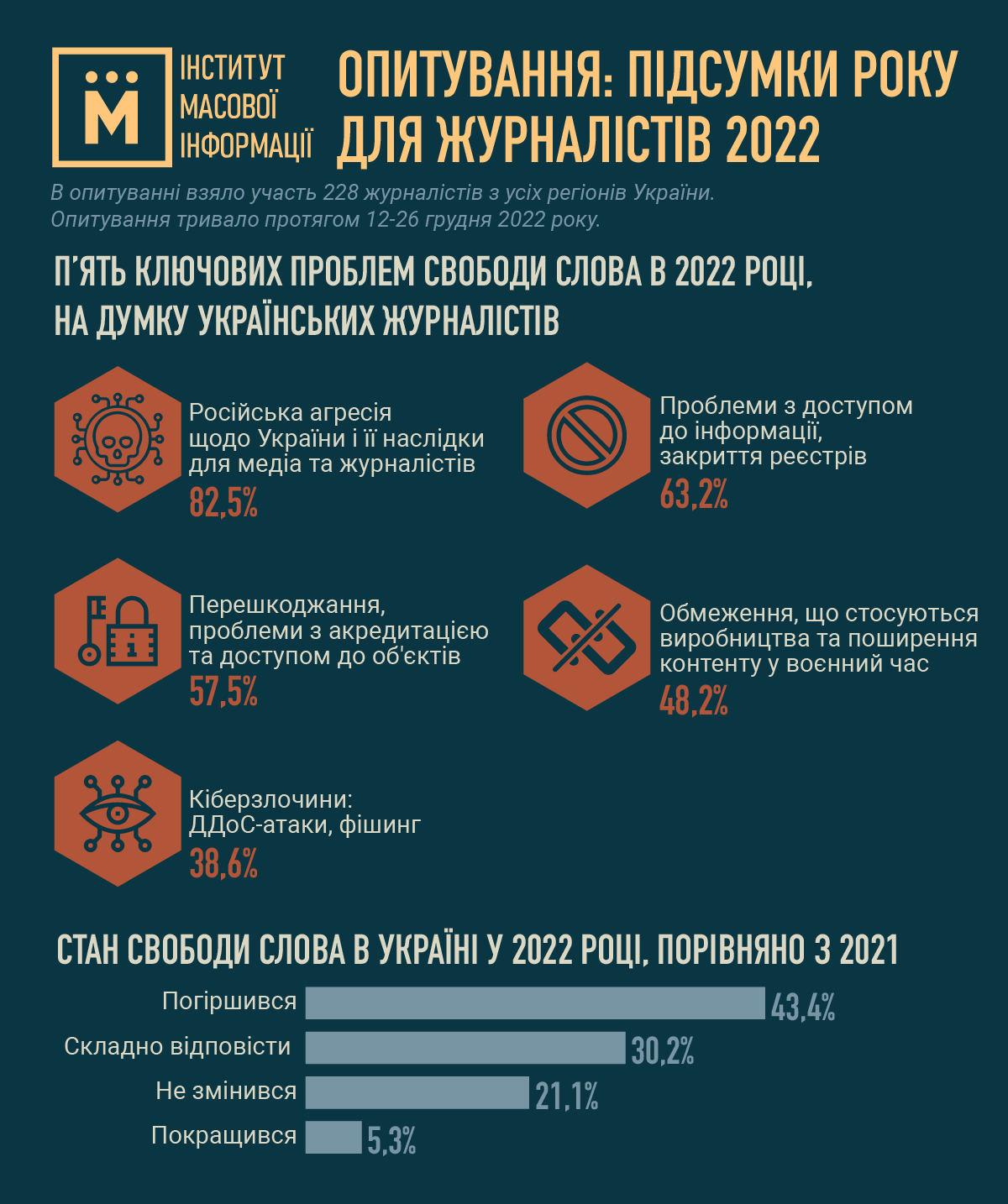43.4% of journalists IMI surveyed believe that the freedom of speech in Ukraine has deteriorated in 2022. At the same time, 30.2% could not answer this question, another 21.1% of journalists believe that the freedom of speech situation has not changed, and 5.3% of respondents even said it has improved.
These are the findings of an anonymous quantitative online survey conducted by the Institute of Mass Information on December 12–26, 2022, using the questionnaire method.**
According to media workers, the main freedom of speech problems are Russia’s aggression against Ukraine and its consequences (82.5% of surveyed journalists noted this). Information access issues and registers becoming classified, which had complicated the work of the media significantly, ranked second (63.2% of respondents). Obstruction, issues with accreditation and access to places (mentioned 57.5% of respondents) came third*.

Survey: Journalists’ Summary of the Year 2022. Survey answered by 228 journalists from all oblasts of Ukraine. Survey period: December 12—26, 2022. Five key freedom of speech issues in 2022, according to Ukrainian journalists: Russia’s aggression against Ukraine and its consequences for mass media and journalists (82,5%); information access issues, registers becoming classified (63,2%); obstruction, issues with accreditation and access to places (57,5%); wartime restrictions on production and distribution of content (48,2%); cybercrimes: DDoS attacks, phishing (38,6%). Freedom of speech in Ukraine in 2022, compared to 2021: Deteriorated (43,4%); Hard to say (30,2%); No changes (21,1%); Improved (5,3%).
Next on the ranking were wartime restrictions on production and distribution of content (48.2% of respondents) and cybercrimes: DDoS attacks, phishing (38.6% of respondents). The answers do not make up 100% when added together, since the participants could choose several options.
Main Challenges for the Ukrainian Media Field*. Survey answered by 228 journalists from all oblasts of Ukraine. Survey period: December 12—26, 2022. Economic and financial challenges (75,40%); working and living conditions complicated by blackouts and mobile connection issues (67,50%); mental exhaustion, lack of rest, constant stress (63,60%); safety risks, costant threat of shelling (54,50%); disinforming and manipulative Telegram channels growing in popularity (54,40%); worsening communication with state bodies (31,10%); narrowing range of topics, inability to properly process information requests (29,40%). *The answers do not make up 100% when added together, since the participants could choose several options. Source: IMI. Created with Datawrapper.
Media workers were also asked to name the main challenges faced by the media field in 2022. It turned out that economic and financial hardships remain the main challenge for journalists – this was noted by 75.4% of journalists IMI surveyed (for comparison: in 2021, only 49% of journalists reported facing economic challenges). Working and living conditions complicated by blackouts and mobile connection issues ranked second (noted by 67.3% of respondents); third place was taken by mental exhaustion, lack of rest, and constant stress (mentioned by 63.3% of interviewed journalists).
“Safety risks, costant threat of shelling” shared the fourth place with “Disinforming and manipulative Telegram channels growing in popularity” (mentioned by 54.4% of respondents each). Another 31.1% of respondents reported being challenged by issues in communication with state bodies. 29.9% mentioned the narrowing range of topics and inability to properly process information requests or registers.
The fact that 61.3% of interviewed journalists indicated that their financial situation worsened in 2022 also testifies to the relevancy of financial challenges. At the same time, the financial situation of 27.3% of interviewed journalists did not change, and 11.4% even reported an improvement in their financial situation, although some of these respondents noted that they had to leave journalism and find a different job.
*The answers do not make up 100% when added together, since the participants could choose several options.
**The research was conducted via a quantitative anonymous online survey based on a simple random sample of potential respondents – journalists and editors. A total of 229 responses by media workers from all regions of Ukraine were received. Of them, 64.9% of respondents were women, 35.1% were men. The maximum error is 5%. The study was conducted on December 12–26, 2022.



